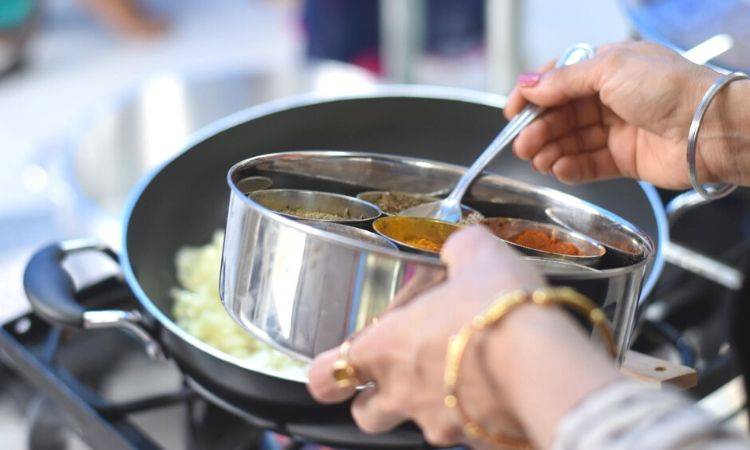During a global pandemic, it can get difficult to plan a healthy Indian meal. When we’re all trying to make sure we don’t run out of essentials, we’re also aware that hoarding is not the answer here. All we need is an easy Indian meal plan to make sure we’re getting the nutrition we need without irresponsible buying. We spoke to experts in food and nutrition to ask them how we can plan healthy, nutritious meals and what we need to look for in grocery stores to avoid unnecessary purchases.

Image Source
What kind of ingredients should you buy?
During a pandemic, we need to make an extra effort to stay healthy and plan our meals well. We spoke to renowned celebrity chef Ranveer Brar about the kind of ingredients you should buy for an easy Indian meal plan. “While I request people to not stock up, we need to ensure we have just enough supplies of a basic cereal-pulse combination, which is the most basic combination for the essential nutrition that our body needs,” he says. “For instance, rice and lentils, wheat flour and lentils, and so on, that take care of the macro-nutrient requirements.”
Related: 5 Healthy Chicken Recipes Which Are Delicious And Full Of Nutrition
We also asked him specifically about the kind of ingredients people should look for in a grocery store, apart from the staples. “I always recommend keeping millets handy, they have a longer shelf-life and have a high concentration of micro-nutrients,” Brar says. “Mixing a bit of nachni, bajra and jowar in your regular atta will ensure a basic supply of micro-nutrients along with the macro-nutrients. Also, Vitamin C intake is a must to boost and sustain immunity. One can keep lemons, amla, oranges, kiwi fruits etc handy. I also suggest keeping lentil flours on hand and/or unpolished lentils with the husk intact. These are high protein and very versatile. For example, there is nearly no limit to the usage of besan to whip up quick filling dishes. Lentils with husk are naturally rich in fibre, something we’ll need in the absence of active exercising. Also, it’s a good idea to have some chia seeds, oats and greens handy for the fibre quotient as well.”

Buy multi-purpose, nutritious ingredients
Nutrition consultant Raksha Lulla tells us to stock up on rava, poha, saavri, ragi, wholewheat flour, jowar, rice and lentils. Apart from the staples, she also suggests buying groundnut oil, milk powder, lime and amla, which can be made into a pickle and used to flavour the most bland food. A large part of planning groceries during a global crisis should be about buying multi-purpose, hassle-free ingredients. Lulla advises buying a healthy supply of cheese slices and butter which can be rolled up inside leftover roti or bread. She also tells people to buy ginger garlic paste, imli and jaggery to make a chutney which can be stored and used as a base for lentils and vegetables in case there is a sudden shortage of supplies. As snacks, Lulla suggests, buy dry fruits, makhanas, and nuts, so that you eat healthy between meals.
Related: 8 Healthy Alternatives To Potato Fries Which Make For Yummy Snacks
Sharda Agarwal, a nutrition therapy practitioner and co-founder of Sepalika, advises people to stock up on nutrient-dense foods that last longer than others. Apart from the staples, she suggests stocking up on vegetables like cabbage, cauliflower, arbi, carrots, and beetroot. If you have kids, Agarwal says, you need to stock packaged milk, high protein legumes like rajma, chhole and lobia, and besan. It’s also a good idea to buy coconut milk and pasta, she suggests.
Related: 8 Healthy And Delicious Broccoli Recipes Which Your Kids Will Love
How should we make a easy, healthy Indian meal plan?
You might have all the ingredients in your kitchen, but if you don’t know how to make the most of them, they’re wasted. And a wastage of food is the last thing we need during a pandemic.
“I’d advise people to be generally mindful of the ingredients that go into daily meals,” Ranveer Brar tells us. “Meals should ideally be healthy, filling and balanced. As there’s an increased likelihood of people being sedentary in the absence of much physical movement, digestion tends to become an issue. Making sure the dishes prepared have a good content of fibre is essential. Also, it’s a good idea to go easy on carbs at this time.”
Raksha Lulla suggests dishes like jowar bhakri with peanut chutney or pickle, rava upma with coconut chutney, and dal parathas. As snacks, Lulla says people should make ragi, besan or atta laddoos with nuts, ghee and sugar. These are healthy options which will keep you full for a long time. She also advises people to drink turmeric milk with aliv seeds, soonth and pepper, amla sharbat, and thandai. Sharda Agarwal tells us to plan one pot meals with vegetables or proteins like dal or chicken, and rice or millets which are convenient and nutritious.
Related: 10 Delicious And Easy One Pot Recipes For A Relaxed Dinner At Home

How are the food and nutrition experts planning their own meals?
We asked the experts how they are planning their own meals at home. Chef Ranveer Brar says he is focussing on small but regular portions through the day. “I cook rice for the family in the morning, which we then reuse in some or the other form, such as fried rice etc,” he says. “I’ve also made it a principle to not splurge, to cook food with the basics that provides essential nourishment to all.”
Nutritionist Raksha Lulla also plans healthy, nutrient-dense meals through the day. This is what her meal plan looks like:
Breakfast: Egg omelette with pav or poha with roasted groundnuts or jeera
Parantha with a hot cup of milk or puranpoli with ghee and a cup of milk
Snack: Fruit if available, sharbat with subja seeds
Lunch: Bhakri with vegetables and amla achaar
Evening snack: Makhana or chana with jaggery, groundnuts, sweet potato chaat or homemade khakhra
Early dinner: Khichdi and dahi or papad, dal and rice, ragi roti with paneer subzi
Bedtime: Turmeric milk with aliv seeds, soonth, pepper and cardamom powder
The next time you go to the grocery store, keep these tips in mind and make a healthy Indian meal plan for yourself and your loved ones. Let’s stay healthy while staying home to fight the COVID-19 pandemic.
Related: Desi Comfort Food: 10 Authentic Indian Recipes From 10 Indian Chefs














